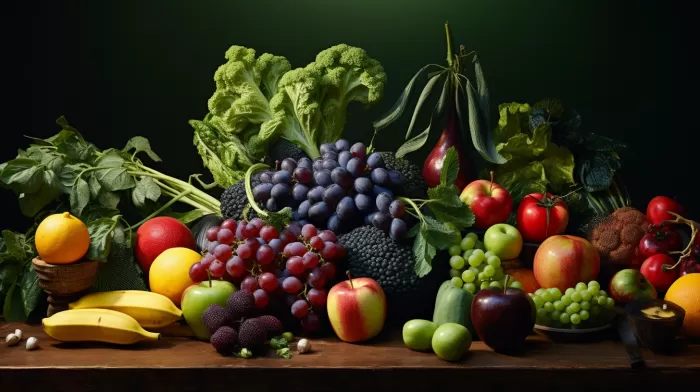Amyotrophic lateral sclerosis (ALS) is a debilitating and catastrophic disease. It attacks nerve cells in the spinal cord and brain, paralyzing its victims, and ultimately leading to a slow and agonizing death over several years. With no effective treatment currently available, it’s essential to explore preventive measures. Fortunately, research reveals that certain foods may help reduce the risk of developing this horrendous condition. In particular, the focus is on colorful fruits and vegetables.
The Importance of Dietary Antioxidants in Preventing ALS
The research into foods that fight ALS largely emphasizes the role of dietary antioxidants in delaying or even preventing the onset of the disease. According to Dr. Alberto Ascherio of Harvard, “ALS is a devastating degenerative disease that generally develops between the ages of 40 and 70, and affects more men than women. Understanding the impact of food consumption on ALS development is important.”
In light of this, Ascherio’s study, one of the largest to investigate the impact of dietary antioxidants in staving off ALS, found that total carotenoid intake was linked to a reduced risk of the disease. Carotenoids are pigments that naturally occur in fruits and vegetables, lending them their vibrant hues.
Specifically, individuals who consumed higher amounts of carotenoids in their diet – particularly beta carotene and lutein found in dark green vegetables – exhibited a significantly lower risk of ALS. However, the researchers did not observe this reduction in risk for ALS with the consumption of other antioxidants, such as lycopene, beta-cryptoxanthin, and vitamin C. Additionally, long-term vitamin C supplement intake did not correspond to a reduced risk of ALS.
Dr. Ascherio states, “Our findings suggest that consuming carotenoid-rich foods may help prevent or delay the onset of ALS. Further food-based analyses are needed to examine the impact of dietary nutrients on ALS.”
Carotenoids: The Key to Combating ALS?
Carotenoids are a group of more than 600 naturally occurring pigments synthesized by plants, algae, and photosynthetic bacteria. They are responsible for the bright red, yellow, and orange colors in many fruits and vegetables. Some of the most common carotenoids include beta-carotene, alpha-carotene, lycopene, lutein, and zeaxanthin.
These colorful plant compounds are powerful antioxidants that effectively neutralize harmful free radicals in the body. In fact, mounting scientific evidence suggests that carotenoids may be essential in the fight against several chronic diseases, including heart disease, stroke, and some cancers. Recently, researchers have turned their attention to the potential role of carotenoids in preventing ALS.
So, which carotenoids seem to be the most effective in combating this debilitating disease? The research conducted by Dr. Ascherio and his colleagues at Harvard singled out beta-carotene and lutein as particularly powerful ALS-fighting nutrients.
Beta-carotene, found in yellow and orange fruits and vegetables as well as dark green leafy vegetables, acts as a precursor to vitamin A in the body. Foods rich in beta-carotene include carrots, sweet potatoes, spinach, kale, and apricots. Meanwhile, lutein, found predominantly in dark green vegetables such as spinach and kale, plays a vital role in maintaining eye health and preventing age-related macular degeneration.
Integrating ALS-Fighting Foods into Your Diet
Including more carotenoid-rich foods in your daily meals can be pretty simple. Start by incorporating a variety of colorful fruits and vegetables into your grocery list and filling your plate with natural, whole foods rather than processed options. Consider adding green smoothies to your breakfast routine or enjoying a delicious salad with a variety of vibrant vegetables for lunch.
You could also explore some superfood options, like spirulina, a blue-green algae known for its high beta carotene and antioxidants content. Moreover, consider replacing unhealthy snacks with healthier alternatives, like carrot sticks, kale chips, or apricots instead of chips and other processed treats.
Remember, every bite you take can either be detrimental or beneficial to your health. By making wise dietary choices and loading up on carotenoid-rich fruits and vegetables, you can effectively reduce your risk of this devastating disease, improve your overall health, and enjoy a brighter, more colorful life.



